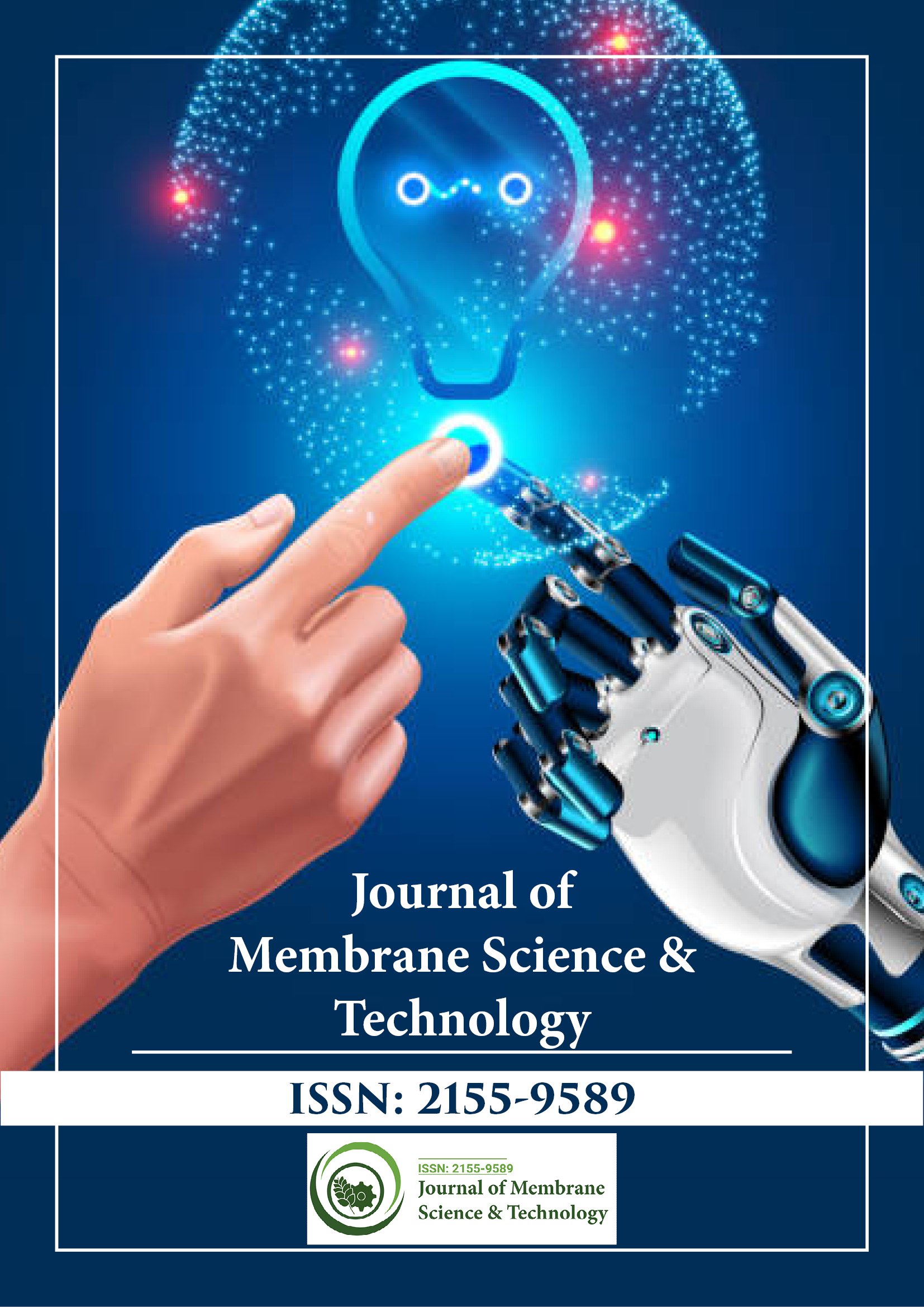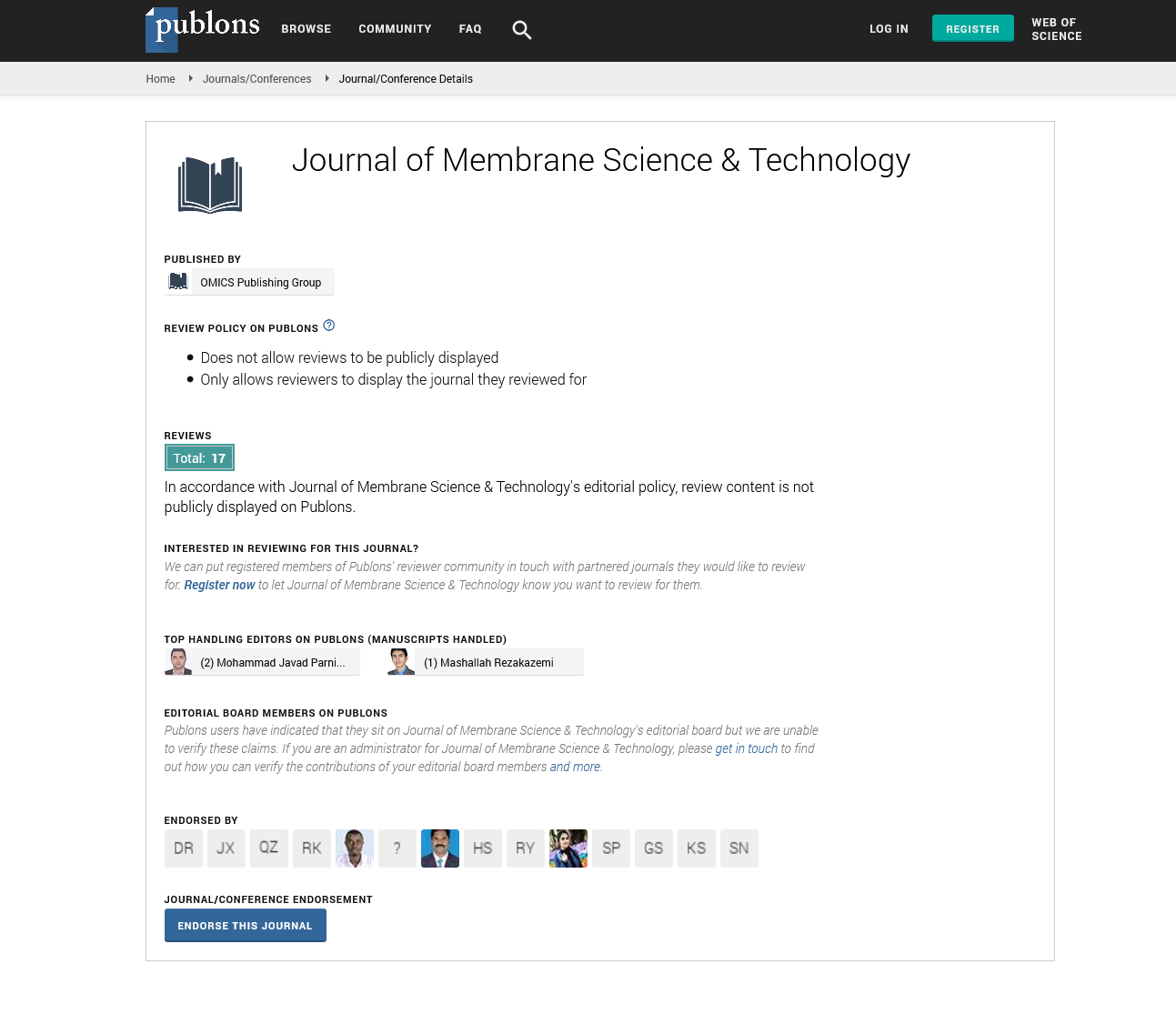Indexed In
- Open J Gate
- Genamics JournalSeek
- Ulrich's Periodicals Directory
- RefSeek
- Directory of Research Journal Indexing (DRJI)
- Hamdard University
- EBSCO A-Z
- OCLC- WorldCat
- Proquest Summons
- Scholarsteer
- Publons
- Geneva Foundation for Medical Education and Research
- Euro Pub
- Google Scholar
Useful Links
Share This Page
Journal Flyer

Open Access Journals
- Agri and Aquaculture
- Biochemistry
- Bioinformatics & Systems Biology
- Business & Management
- Chemistry
- Clinical Sciences
- Engineering
- Food & Nutrition
- General Science
- Genetics & Molecular Biology
- Immunology & Microbiology
- Medical Sciences
- Neuroscience & Psychology
- Nursing & Health Care
- Pharmaceutical Sciences
Low fouling and energy membrane desalination process
2nd International Conference on Membrane Science and Technology
September 13-14, 2018 | London, UK
Adel Obaid Sharif
University of Surrey, UK
Scientific Tracks Abstracts: J Membr Sci Technol
Abstract:
Reverse osmosis (RO) membranes have been used for seawater desalination and freshwater supply for long time. Nowadays, RO is considered to be the most efficient technology for seawater desalination and has the highest number of installations worldwide. Despite the high performance and reliability of RO technology in saline water treatment, it is still considered expensive for many countries. Average power consumption in RO technology is between 3 kWh/m3 and 4 kWh/m3. Recently, Forward Osmosis (FO) process has been suggested for seawater. FO hybrid system consists of FO pretreatment and RO regeneration process which has the potential of improving the performance of conventional RO system. The FO power consumption is negligible because it employs natural osmosis for freshwater extraction from seawater. Most power consumption in FO-RO process is due to the energy requirements in the RO regeneration system. Several studies have investigated the feasibility of FO process and the system energy efficiency compared to RO system. Unfortunately, there are limited data available about the performance of FO process in field carried out by Modern Water Company. Pilot plant studies demonstrated that FO pretreatment can improve the performance of subsequent RO process significantly. The current study evaluates the performance of FO-RO system through investigating the impact of operating parameters on system power consumption and product water quality. Conventional RO performance has been evaluated under constant pressure and constant recovery rate using a number of seawater feed salinities. Pre-developed FO computational program and Reverse Osmosis System Analysis (ROSA) software have been used to estimate the performance of FO-RO and RO processes. The outcomes of current study can be considered to improve the performance of FO-RO system. Recent Publications 1. Jakub Jakowiecki, Agnieszka Sztyler, Slawomir Filipek, Pingzuo Li, Karthik Raman, et al. (2018) Aquaporin graphene interface: relevance to point-of-care device for renal cell carcinoma and desalination. J. of the Royal Society Interface Focus 8(3):14???35. 2. Ali Altaee, Guillermo Zaragoza, Graeme J Millar and Adel O Sharif (2018) Limitations of osmotic gradient resource and hydraulic pressure on the efficiency of dual stage PRO process. Desalination and Water Treatment 105(2018):11???22. 3. Ali AlTaee and Adel O Sharif (2016) Energy efficiency of RO and FO-RO system for high salinity seawater treatment. Clean Technologies and Environmental Policy Journal. 1(2017). 4. Adnan Alhathal Alanezi, Adnan Ahmad and Adel O Sharif (2016) Performance investigation of O-ring vacuum membrane distillation module for water desalination. J. of Chemistry 2016:1???11. 5. Ali Altaee, Graeme J Millar, Adel O Sharif and Guillermo Zaragoza (2016) Forward osmosis process for fertilized solutions from seawater using a mixture of draw solutions. Desalination and Water Treatment 34:1???17.
Biography :
Adel Obaid Sharif is a Professor of Water Engineering and Process Innovation and Founder Director of the Centre for Osmosis Research and Applications, (CORA) at Surrey University, UK. He is the winner of the 2005 UK Royal Society Brian Mercer Senior Award for Innovation in Science and Technology. In 2012 Prof. Sharif with the Surrey Water Team were awarded the Queen’s Anniversary Prize for Water Research in a reception at Buckingham Palace by The Queen and Prince Philip. Prof. Sharif is a founder of Modern Water plc, a London Exchange AIM Market listed company specialized in desalination and renewable power generation. His research interests are in desalination, water treatment, membrane separation, and renewable energy. He has over 150 publications; is an inventor and co-inventor of more than 30 inventions and has supervised over 20 PhD theses and more than 50 M.Sc dissertations. Research interest: Membrane Separation, Desalination, Water Treatment and Renewable Energy.
E-mail: a.sharif@surrey.ac.uk

